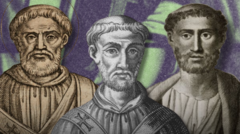North Africa, once the cradle of Christianity, produced three influential popes—Victor I, Miltiades, and Gelasius I—whose contributions to the Church resonate today, notably in the establishment of Easter Sunday and St. Valentine’s Day. As discussions about the next pontiff arise, many hope for a return of the papacy to Africa, following a 1,500-year absence.
The Legacy of African Popes: Shaping Modern Christianity and Celebrating Love

The Legacy of African Popes: Shaping Modern Christianity and Celebrating Love
Exploring the profound impact of North Africa's early popes on Christianity and the cultural significance of Valentine's Day.
North Africa was a vital center for early Christianity, giving rise to three notable popes whose legacies continue to influence the Church. These figures—Pope Victor I, Pope Miltiades, and Pope Gelasius I—ushered in significant changes during an era when the Roman Empire reached across regions that now comprise Tunisia, Algeria, and Libya.
Historian Prof. Christopher Bellitto emphasizes that North Africa was once considered the "Bible Belt of ancient Christianity." Currently, many in Africa hope for a papacy that will reclaim its roots on the continent as Pope Francis's successor is chosen. The contributions of the three popes underscore complex historical shifts, marked notably by the establishment of dates for important Christian celebrations.
Pope Victor I (189-199 AD), believed to be of Berber origin, played a crucial role amid the persecution of Christians in the Roman Empire. He negotiated the celebration of Easter, resolving disputes between the Eastern and Western Christian factions concerning the date of this significant feast. The introduction of Latin as the Church’s liturgical language during his papacy marked a pivotal transition from Greek and fortified the Church's cohesive identity.
Following him, Pope Miltiades (AD 311-314) benefited from the rise of Christianity as the official religion of the Roman Empire, becoming the first pope to have an official residence granted by Emperor Constantine. His papacy marked the beginning of a more institutionalized Catholic presence in Rome with the establishment of Lateran Basilica, a cornerstone of Catholicism.
The most venerated of the three, Gelasius I (AD 492-496), is often recognized for coining the term "Vicar of Christ," a designation that has enduring significance within the Church. His ideological contributions included the Doctrine of the Two Swords, which articulated the dichotomy of powers between the Church and the state, emphasizing the Church's divine mandate.
Additionally, Gelasius I established St. Valentine’s Day on February 14, 496 AD, to honor the Christian martyr St. Valentine, intertwining Christian traditions with existing Roman festivities. This move reflected an effort to Christianize earlier pagan practices, showcasing an adaptive approach to cultural integration.
Despite their monumental impact, there has not been an African pope since Gelasius I, a vacancy many associate with the decline of Christianity in North Africa following the spread of Islam and subsequent political changes in the region. However, the historical absence of African popes is also attributed to the evolving dynamics of Church governance, which has leaned towards a predominantly Italian-centric approach over the centuries.
Today, Catholicism in Africa is burgeoning, with a significant demographic shift that sees over 280 million Catholics on the continent, representing a crucial part of the global faith community. Currently, figures such as Fridolin Ambongo Besungu and Peter Kodwo Appiah Turkson are in the running to succeed Pope Francis, sparking hopes for an African papacy that could reshape the Church yet again as it evolves within its historical and cultural context.





















